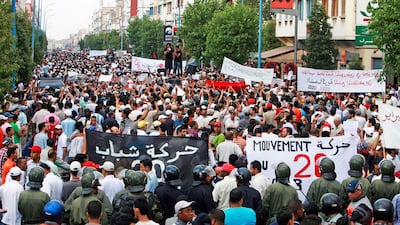For many people watching the Arab Spring unfold across the region, the story of the revolution revolves solely around the news reports; from Mohamed Bouazizi's act of self-immolation in Tunisia to 18 days of mass protest in Tahrir Square to violence on the streets of Sana'a. But behind the headlines lie millions of personal narratives, each of which tells a separate tale connected to the uprisings, each offering one of countless differing angles and perspectives.
Although social media have played a role in helping bring some of these stories to light, they've mainly stayed unheard. But a new initiative by the Doha Film Institute is hoping to change this by empowering people to express themselves through storytelling, scriptwriting and filmmaking in ways they might never have done before.
Harrer Harrer (liberate in Arabic) is a series of week-long workshops that has been travelling around the region since the start of June. It began in Amman, before moving on to Cairo and then Beirut, and will also be stopping in Tunis, Marrakech and Jaffa, with plans for other cities to be added to the itinerary in due course. In each location, the Doha Film Institute teams up with a film school or organisation, such as the Royal Film Commission in Jordan or the American University in Cairo, which finds it a space, and also works with a local director who helps give the workshops.
Interest has been high, but sadly logistics have meant that class sizes are relatively small. To apply, students must submit a one-page script and from these, the organisers choose 16 to take part. Over the course of a week, the students discuss their stories and choose the ones that they will then go on to turn into one-minute shorts.
"The whole idea is to fictionalise the revolution and what is happening," says Scandar Copti, the Oscar-nominated director and head of DFI Education. "We come from a patriarchal society that is not trained to make decisions for itself. With this we're trying to build a platform that is a safe environment where everyone can express themselves and make choices in terms of writing, shooting and editing."
Aside from providing technical support and explaining the techniques of storytelling, Copti says the course leaders don't interfere with the content of the scripts.
In just a few weeks, the stories already told have revealed an eye-opening array of opinions and views regarding the revolutions in each country. One of the subjects to have been brought up repeatedly concerns the differences between generations. "There's a lot of emphasis from the participants in the son or daughter wanting to be involved in the change, while the parents are too oppressed to believe it," says Copti. "I've seen it in more than a dozen scripts." Other stories to have emerged include feminist issues - from both male and female writers - plus those rooted directly in painful experience.
Interestingly, the students' opinions of the revolution haven't always looked at change in a positive light. In Cairo, where, because of the number of applicants, 18 scripts were chosen, of which 12 were produced, one of the students was from the Zabbaleen community, the Coptic Christians who have served as the city's informal rubbish collectors for the past 70 years. "He said that he was scared that the change would take away his job, with the municipality organising garbage collection themselves without needing people like him," says Copti.
Helping to provide a broad spectrum of stories from across society, the classes are made up of participants from different walks of life. In Cairo, there were scientists, economists, students and even a network engineer in the workshop. "We only had two filmmaking students," says Ritesh Batra, the project manager of Harrer Harrer, and one of the course leaders who went to Cairo. "We have a pretty broad base."
Aside from the scripts being just one page and the shorts being only one minute in length, one of the stipulations for the story is that it must be fictional, a factor Copti thinks helps to give it greater emphasis. "If you don't have a character when you watch a movie and you don't identify with this character, it never becomes your story. Unlike in documentaries, which are sometimes like news, when you fictionalise something it becomes more personal because you see yourself as the protagonist in the end."
With the reverberations of the Arab Spring still rumbling across the region, there are several places where it's still unsafe to hold the Harrer Harrer workshops. For people who can't attend one of the courses, Copti says a website is being developed. "We want it to be a place of debate and an exchange of thought and emotions."
And it's this new platform for expression that really underlines the whole programme, far greater than the filmmaking skills the students are receiving. "It's not the end product that we're putting a lot of emphasis on. We watch the films once and then go home," says Copti. "It's what they go through in the process that is the great thing about it. We want to help create a society that can make decisions on a very personal level, to create a generation who can speak their mind and express themselves."
There will be an opportunity for people not on the courses to see the output of the workshops, to hear the stories that might otherwise have remained unheard behind the headlines. The films from Harrer Harrer will be showcased as part of a travelling international exhibition, which will be launched at the Doha Tribeca Film Festival in October. While they certainly won't boast the budgets or big names of the films getting red-carpet treatment, the shorts from Harrer Harrer could well be the most important inclusions at this year's festival.

